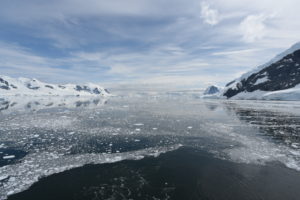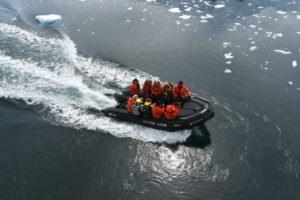A REASON TO CELEBRATE…AND HAMLET…
Depressing as headlines shouting ad nauseum about Covid, the crisis in Ukraine and U.S. politics etc are, there is something in the world to celebrate — the anniversary of an accomplishment worthy of Hamlet’s famous line: “What a piece of work is a man! How noble in reason, how infinite in faculty! In form and moving how express and admirable!”.
Signed on 1 December 1959 and entered into force on 23 June 1961, the Antarctica Treaty has ensured that one place on earth has never seen war, the environment is fully protected and scientific research has priority. It is arguably the most successful agreement of its kind. Considering the continent’s early history and the wealth it may contain, that’s quite a feat.
Captain James Cook spent the years 1772 to 1775 looking for a place rumoured to exist for millennia. He had no idea he’d come within 80 miles of it when he wrote:

“The risk one runs in exploring a coast in these unknown and Icy Seas, is so very great, that I can be bold to say, that no man will ever venture farther than I have done and that the lands which may lie to the South will never be explored.” As one of history’s greatest explorers and seafarers, Cook of all people should have known better. Less than fifty years from Cook’s failure, men set foot on Antarctica.
Depending on whose version you believe, they were either from a Russian expedition on January 27, 1820, or a British one three days later.
As is the nature of humankind, rapacious commercial ventures hell-bent on exploiting the natural resources followed in quick succession. Fur seals and whales were hunted nearly to extinction. Discarded whale bones, preserved by the cold and shortage of natural scavengers, are stark evidence of human predation.

Thankfully, some came only to sate another distinctly human appetite — the need to venture into the unknown, and be the first to do so. Roald Amundsen, Robert Scott and Ernest Shackleton are the best known, but scores of others pushed courage and endurance beyond limits unfathomable to normal people. Even today, Antarctica remains a place where only the toughest and bravest succeed.
DIFFERENT EXTREMES
This month British Army physiotherapist Preet Chandi became the first woman of colour to ski solo to the South Pole.
To learn more about the ability of humans to survive on Mars, NASA is tracking two explorers on an 80 day, 2,268-mile (3,650 kilometers) trek across Antarctica. Along the way they are measuring and monitoring pretty much everything that happens to minds and bodies pushed to the utmost.
On a far lesser level, in November a “boutique airline” did another Antarctica “first” by landing an Airbus A340 on a 3,000-meter (10,000 ft) runway carved out of the ice. That ought to be worrying, rather than celebrated. Smaller planes have been taking limited numbers of tourists to the frozen south for several years. Antarctica’s native species have been isolated for the past 15 to 30-million years. But as numbers increase, so does the danger of invasive species, especially marine species that can cling to the hulls of research, fishing and tourism vessels.
Full disclosure: I went to Antarctica as a tourist and would do it again in a hearbeat. But, I hasten to add, it was on a small ship. Tour operators licenced to work in Antarctica are expected to observe and enforce protective protocols to the nth degree.

When we went ashore (twice a day) boots were cleaned and disinfected before leaving the ship and on re-boarding. The rules were clear and simple: No disturbing the wildlife (which includes “Give Way to Penguins” marching to and from the sea). Take nothing but pictures, leave nothing but footprints. At most we ventured less than a kilometer from the shoreline. And it was wise to make sure you did what parents warn kids to do before a long car journey, because you have to ‘hold it’ no matter what.
MODERN THREATS
Even with all that, however, Antarctica isn’t safe from the “plague of the day”. “A Belgian scientific research station in Antarctica is dealing with an outbreak of Covid-19, despite workers being fully vaccinated and based in one of the world’s remotest regions.”
The remoteness means the outbreak can be contained. Self-isolation from another problem the world seems incapable to the point of willful self- destruction to properly address, is another matter.
An international team of researchers concluded Antarctica’s Thwaites glacier is in danger of collapsing by 2030 due to global warming. Dubbed “the Doomsday glacier”, it contains enough water to raise sea levels world-wide by more than half a metre (nearly two feet).
One of the provisions of the Antarctica Treaty is that no nation will stake a territorial claim on the continent. Climate change holds territorial limits in disdain. That alone ought to be impetus for nations to deal with it in the spirit of the world’s most successful joint effort.
If they fail to do so, Hamlet has another fitting line: “I have of late — but wherefore I know not — lost all my mirth…”
Comments are welcomed. Click CONTACT on the site header.
To receive e‑mail alerts to new posts, Click SIGN-UP on the header.
4 thoughts on “A REASON TO CELEBRATE…AND HAMLET…”
and as climate change accelerates perhaps
the continent will become habitable(what a
shame!) and if it does host flawed humankind
perhaps it could also remain without conflict…
that’s doubtful because we just spoil everything…
Antarctica habitable is a nightmare scenario. It’s one of my top three wonderful destinations on Earth.
The world needs someplace that is sacred, challenging and mysterious.
Having skied at numerous mountainous ski resorts and gone off the runs into the semi-wild areas; and hiked a few remote trails; I have experienced the sounds of nature’s silence. But you capture in your blog something far beyond these thrills. It stirs my interest to follow your journey sometime soon. Thanks for your wonderful story and connecting it with a very newsworthy editorial as well. Very informative Allan. Thanks, Fred
Thanks Fred. If you do make it to Antarctica, I am in no doubt you’ll love it.